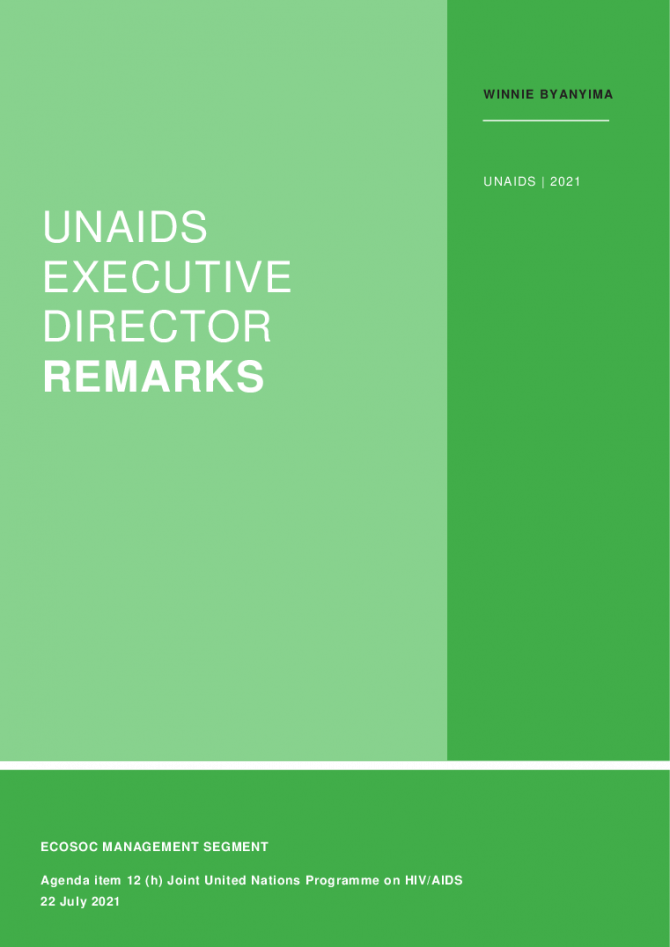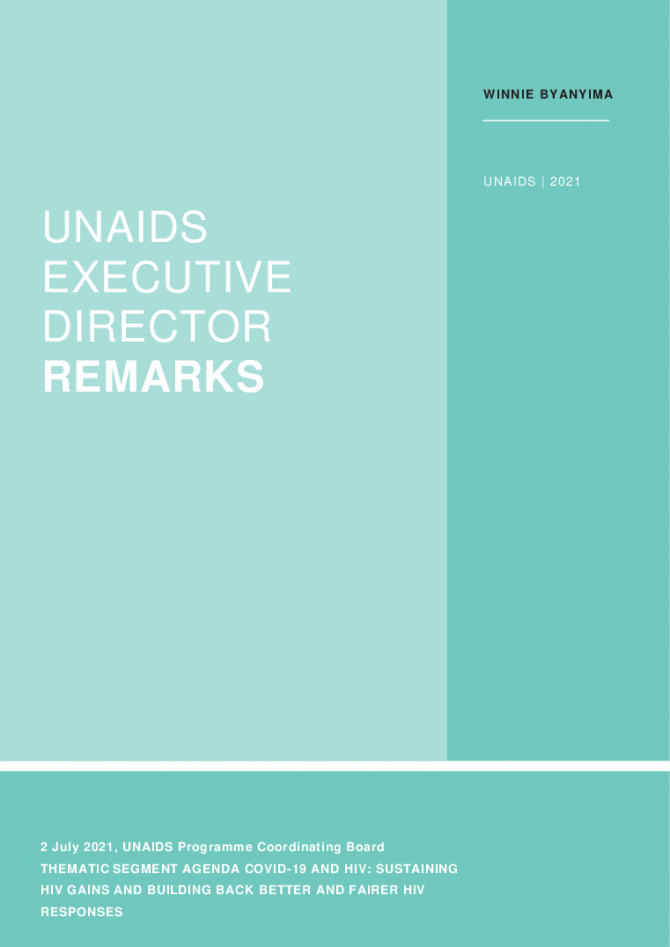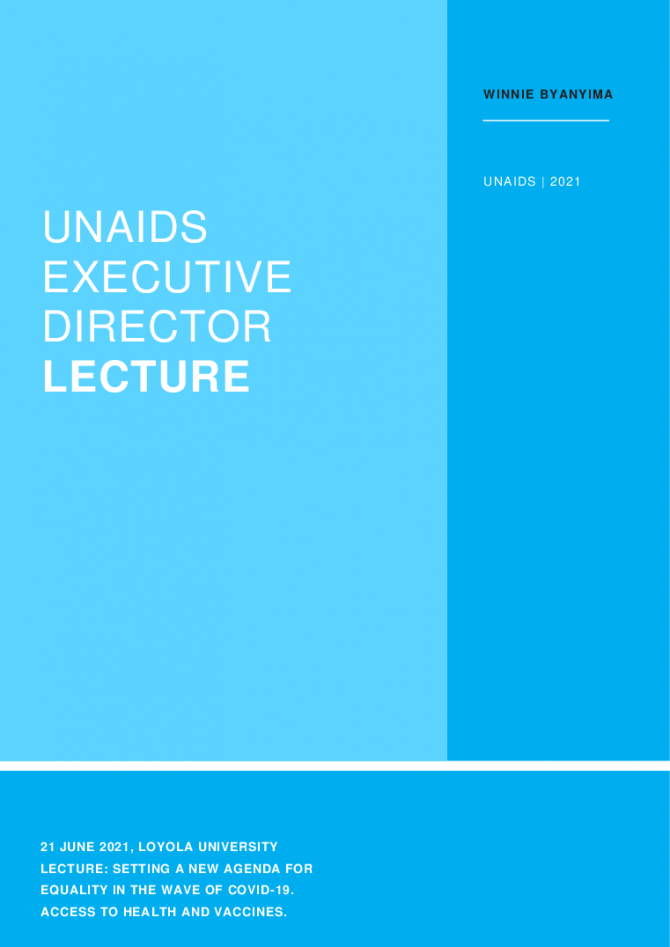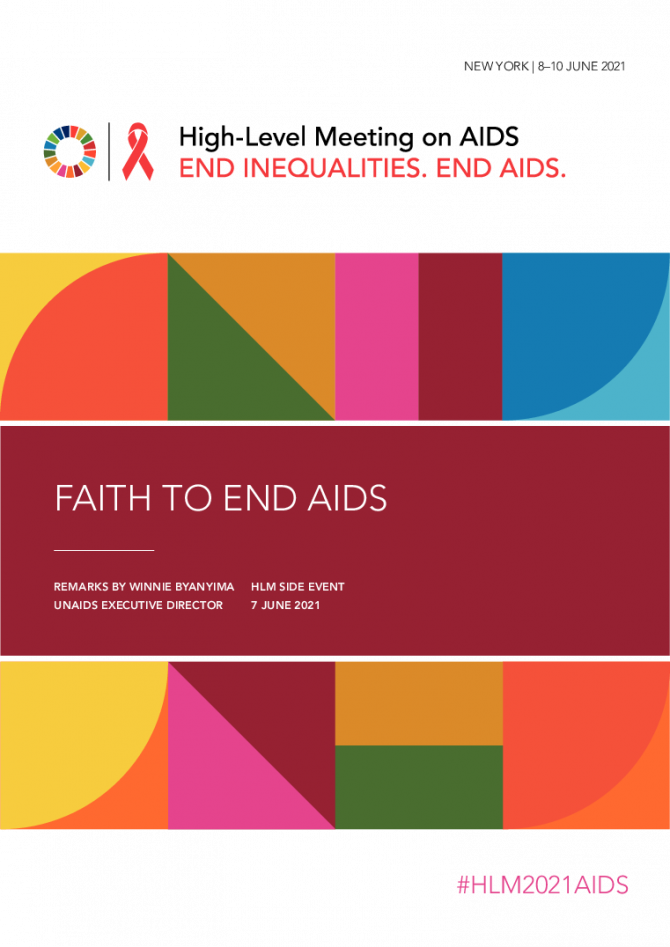

Update
Opening remarks by UNAIDS Executive Director Winnie Byanyima at the High-Level Meeting on AIDS
08 June 2021
08 June 2021 08 June 2021Excellencies, distinguished delegates, colleagues, friends.
Thank you, General Assembly President Bozkir, Deputy Secretary-General Amina Mohammed, co-facilitators Ambassador Gertze of Namibia and Ambassador Fifield of Australia, and all Member States; together you’ve drafted, negotiated, and delivered this Political Declaration. It will be the basis of our work to end this pandemic that has ravaged communities for 40 years.
AIDS is not over. It is one of the deadliest pandemics of modern times. Since the start of the epidemic 77.5 million people have been infected with HIV. We have lost nearly 35 million people to AIDS. An AIDS death every minute is an emergency! HIV rates are not following the trajectory that we together promised. Indeed, amidst the fall-out from the Covid crisis, we could even see a resurgent pandemic.
But a never-ending HIV pandemic is not our fate. In spite of all the set-backs, we can end AIDS as a public health threat, as we promised, by 2030, if we come together.
Business as usual, however, would fail. The programmes that have secured substantial progress will not enable us to finish the journey because the road is blocked. The evidence and analysis is clear. Inequalities in power, status, rights and voice are driving the HIV pandemic. Inequalities kill. As the Global AIDS strategy sets out: to end AIDS, we have to end the inequalities which perpetuate it.
There’s another huge benefit to this approach. The same laws, policies and strong people-centred health services needed to end AIDS, will also help the world overcome Covid-19, be ready to tackle future pandemics, and support inclusive economic growth and the human rights of all. We will all do better.
Here are three bold shifts we need to take together:
- We need to end inequalities in access to health technologies, by spurring the best science and getting it to everyone.
COVID-19 showed science moves at the speed of political will. We need to speed up AIDS science by investing in innovations in treatment, prevention, care, and vaccines, as global public goods.
And we need to deploy science in ways that shrink instead of grow inequalities.
For example, let’s get the new long-acting anti-retroviral medicines that will make it easier to treat and prevent HIV to women in all their diversity and key populations in the global South first, not years after people in rich countries have access.
Let us ensure that all medicines which can prevent deaths of people living with HIV are manufactured by multiple producers affordably especially in the global South, where the disease is concentrated
We need funding, but we also need to reform failing rules on intellectual property, and support globally distributed production, so access to life-saving science is no longer dependent on the passport you hold. - We need to end the inequalities in access to essential services, by delivering on guaranteed health and education for everyone. For many communities, new HIV infections have become rare; and living long, fulfilling lives with HIV is the norm. But within and between countries, a widening gap separates those who have prevention, treatment and care services and their rights respected and those who are excluded.
Today we are setting bold, ambitious goals to reach 95% of those in need with HIV treatment and prevention: to get there we need to re-imagine HIV services, making them easy to access and designed around people’s lives.
We need to ensure all girls complete secondary education and are empowered with the full set of services and rights.
We need to end user fees for essential services and provide these services through public systems funded by taxation. We need to integrate community-provided services. We need to combat tax avoidance, which impedes domestic resourcing for health and education.
Most developing countries are facing severe fiscal crisis, with a revenue loss above 20% in 2020 and health budgets under threat, with Africa under especial pressure.
This is a time to increase revenues, and that requires an end to tax dodging and tax competition that empty public coffers.
We also need debt restructuring to overcome the COVID19 shock and the establishment of a fair debt crisis resolution mechanism. We need to step up, not step back on the commitment to aid as 0.7% of gross national income by all developed countries and ensure that more of the IMF’s USD 650 billion Special Drawing Rights issuance flows to low and middle-income countries. - We need to end the inequalities in the realisation of rights, particularly for people living with HIV, and those vulnerable to or affected by HIV.
I applaud Member States’ commitment to reform laws and protect rights. The evidence shows that when laws are strengthened to support gender equality and the rights of key populations and confront stigmatisation, countries have much greater success in treatment and prevention programmes, benefiting everyone. They’ve rolled back HIV.
We need to keep moving forward in our common journey, away from harmful, punitive, outdated often colonial laws and from all forms of discrimination.
This moment calls for us to work together across sectors, across countries. Populism’s false promises are proving no match to biology: as Covid reminds us, we’re not just interconnected, we’re inseparable.
We cannot end AIDS in one country or one continent, we can only end AIDS everywhere.
I pay tribute to the civil society groups from across the world whose fight against inequalities has been the spur to action. You, communities, women’s groups and grassroots movements, have constantly pushed us; at times that pushing has been uncomfortable; but my message to you is: keep pushing us all. Keep the fight on! Pressure from the power of people is key to ending inequalities and ending AIDS.
Martin Luther King said the moral arc of the universe is long, but it bends towards justice. He didn’t mean this process is automatic. As he noted, “social progress never rolls in on wheels of inevitability; it comes through the tireless efforts of people”. The trajectory of new HIV infections and AIDS deaths will not, through business-as-usual, bend down, but we can pull it down.
We cannot be neutral on inequalities. To get back on track to ending AIDS, we must be deliberate in confronting them. The only alternative is a vicious cycle of injustice, illness, and emergency. The most unrealistic thing we could do now is to imagine we can overcome our crises through minor adjustments or tinkering.
Whether we are remembered as promise-breakers or promise-keepers, as failures or victors, as the people who ended AIDS, or only as the people who could have ended AIDS, is up to us.
Epidemics magnify our worst traits—inequalities, injustices, and fear; but also, our best traits—ingenuity, resilience, and courage.
I’m confident we will win, together. Thank you.
UNAIDS
The Joint United Nations Programme on HIV/AIDS (UNAIDS) leads and inspires the world to achieve its shared vision of zero new HIV infections, zero discrimination and zero AIDS-related deaths. UNAIDS unites the efforts of 11 UN organizations—UNHCR, UNICEF, WFP, UNDP, UNFPA, UNODC, UN Women, ILO, UNESCO, WHO and the World Bank—and works closely with global and national partners towards ending the AIDS epidemic by 2030 as part of the Sustainable Development Goals. Learn more at unaids.org and connect with us on Facebook, Twitter, Instagram and YouTube.
Related

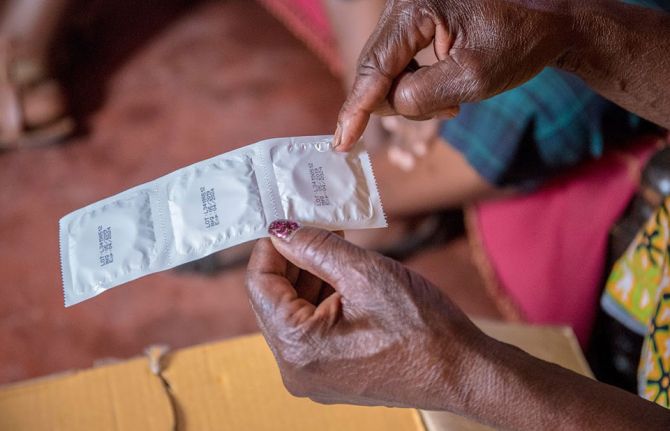
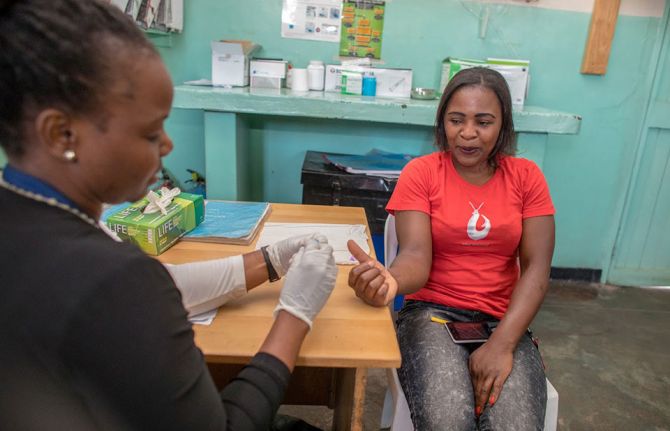
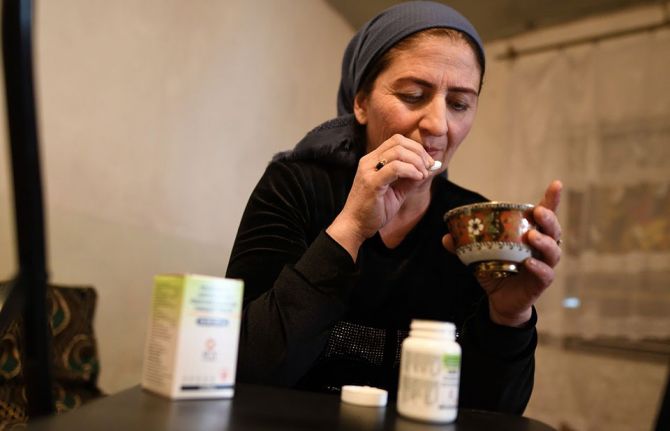
Feature Story
The world can only beat AIDS by ending the inequalities that drive the epidemic
21 May 2021
21 May 2021 21 May 2021By Winnie Byanyima, UNAIDS Executive Director; and Tomas Tobé MEP, Chair of the European Parliament’s Development Committee
Forty years since the first cases of AIDS were diagnosed, the fight against HIV goes on. Although the world has developed the scientific knowledge and medical expertise to keep people living with HIV alive and healthy and prevent new HIV infections, we are not on track to end the AIDS epidemic as a public health threat by 2030.
In 2019, almost 700,000 people died from AIDS-related illnesses. A staggering 1.7 million people were newly infected by HIV - more than three times the target set in 2016, which would have put us on course to end the AIDS epidemic.
The medicines, information, and prevention tools are simply not reaching the people who need them most. We need a new approach that reduces the inequalities that drive the AIDS epidemic and puts people at the centre, prioritising human rights, respect, and dignity.
Social injustices and inequalities fuel epidemics. For example, the AIDS epidemic is having a devastating impact on an entire generation of young women and girls in sub-Saharan Africa. Around 4500 adolescent girls and young women aged 15-24 acquire HIV every week in this region, and they are twice as likely to be living with HIV as their male peers.
At the same time, girls and young women face sexual and gender-based violence, unintended pregnancy and may be forced to drop out of school. Yet, completion of a high school education, including comprehensive sexuality education, is one of the surest ways to keep young women and girls free of HIV.
It is also deeply concerning that more than 60 percent of new HIV infections globally occur among key populations (gay men and other men who have sex with men, people who use drugs, sex workers, transgender people, prisoners, and migrants) and their sexual partners. Entire communities and groups of people are being locked out of the right to health, well-being and to dignity because they are marginalised and criminalised.
This can - and must - change.
The UNAIDS Global AIDS Strategy 2021-2026 provides clear and effective guidance on what needs to be done to create fairer societies to get the world back on track to end the AIDS epidemic as a public health threat by 2030.
The strategy aims to put people at the centre, removing social and structural barriers that prevent people from accessing HIV services, empowering communities to lead the way, strengthening and adapting systems so they work for the people who are most acutely affected by inequalities, and fully mobilising the resources needed to end AIDS.
The European Union has the political weight, the financial clout, and the policy tools to significantly contribute to the global fight against HIV/AIDS. The European Parliament has just adopted a Resolution on Accelerating progress and tackling inequalities towards ending AIDS as a public health threat by 2030 in response to the Global AIDS Strategy.
It outlines concrete actions that the EU should take to end AIDS once and for all. These include supporting partner country efforts to build strong and resilient health systems able to deliver HIV-sensitive universal health coverage, to prioritise health as part of EU-Africa relations and to scale-up investments in UNAIDS and the Global Fund to Fight HIV, Tuberculosis and Malaria.
The resolution also seeks to mobilise EU leadership in addressing the human rights and gender inequality drivers of HIV/AIDS and to ensure that the EU supports community-led responses as key components in an effective HIV/AIDS response.
Next month, countries will gather for the United Nations General Assembly High-Level Meeting on HIV/AIDS where they are expected to back a bold new plan to end the AIDS epidemic, including new targets for 2025.
By achieving these targets, the number of people newly infected with HIV will fall to 370,000 by 2025, and the number of people dying from AIDS-related illnesses would be reduced to 250,000. Tackling the intersecting inequalities that fuel the HIV epidemic will be crucial to success.
The COVID-19 pandemic has exposed profound social and economic inequalities, underfunded public health systems, and the fragility of global responses. Certainly, COVID-19 is threatening to undermine hard-won gains made by the HIV/AIDS response, further threatening progress towards ending AIDS by 2030.
At the same time, countries are leveraging the HIV infrastructure and lessons learned from dealing with the HIV epidemic for a more robust response to both pandemics. Indeed, we have a unique opportunity to translate the right to health into rights-based, equitable, people-centred systems.
We must utilise this window to intensify global solidarity, including sustained investments in development, to build more resilient societies that reinforce everyone’s security.
The EU and UNAIDS share core values of humanity and equality to ensure that no one is left behind. Ending the AIDS epidemic by 2030 remains within the world’s reach but it cannot be done without creating stronger societies built on the principles of gender equality, social justice, and the recognition of universal human rights, including sexual and reproductive health and rights.
Failure to do so will put the lives of millions at risk and undermine the common mission of achieving the 2030 Sustainable Development Agenda, including the end of AIDS as a public health threat.
This op-ed was first published on theparliamentmagazine.eu
UNAIDS
The Joint United Nations Programme on HIV/AIDS (UNAIDS) leads and inspires the world to achieve its shared vision of zero new HIV infections, zero discrimination and zero AIDS-related deaths. UNAIDS unites the efforts of 11 UN organizations—UNHCR, UNICEF, WFP, UNDP, UNFPA, UNODC, UN Women, ILO, UNESCO, WHO and the World Bank—and works closely with global and national partners towards ending the AIDS epidemic by 2030 as part of the Sustainable Development Goals. Learn more at unaids.org and connect with us on Facebook, Twitter, Instagram and YouTube.
Related

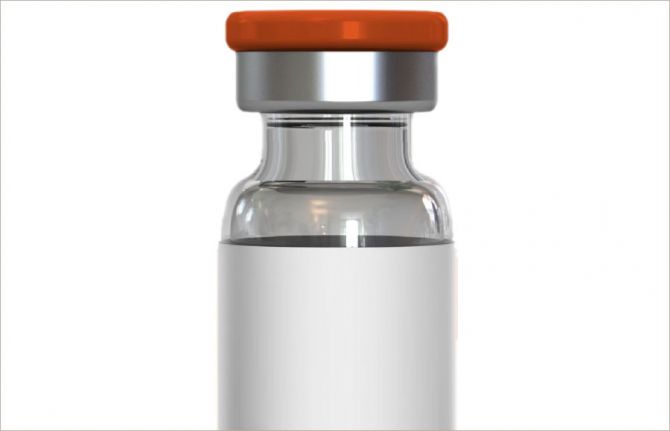
Press Statement
Statement from the Executive Director of UNAIDS, Winnie Byanyima on the decision by the United States of America to support the TRIPS waiver for COVID-19 vaccines
06 May 2021 06 May 2021I applaud the announcement from United States Trade Representative Katherine Tai supporting the waiving of intellectual property protections for COVID-19 vaccines.
This is the kind of global leadership the world desperately needs as we witness horrific scenes in countries like India, where only nine in 100 people have been vaccinated. To date, more than 1.1 billion doses of vaccine have been administered globally, but more than 80% of those have been administered in high- and upper-middle income countries, while just 0.3% have been administered in low-income countries.
We are in a race to vaccinate the majority of the world’s population to curb death tolls and before more potent variants of COVID-19 emerge, rendering current vaccines ineffective. The faster we can scale up global vaccine supply, the faster we can contain the virus and the less chance we will face a day when variants prove resistant to existing vaccines. As the United Nations Secretary-General, Antonio Guterres has said “no one is safe until everyone is safe”.
The TRIPS waiver would enable the sharing of technologies, data, know-how, patents and other intellectual property rights across the world. The announcement of the US administration sends a powerful signal to the rest of the G7 and to the European Union to also support the World Trade Organization TRIPS Waiver and inspire other countries to take a powerful stand in favour of people before profits. This remarkable position from the US government is a fundamental step towards a People’s Vaccine.
To ensure everyone, everywhere has access to a lifesaving vaccine, we also need to see a pooling of technology through the World Health Organization’s COVID-19 Technology Access Pool, as well as financing to help build a network of vaccine manufacturing in developing countries. These three actions can together build a sustainable system to vaccinate the world, reach the needed herd immunity and open the paths to make the world best prepared for future pandemics.
As we have learned from 40 years of fighting AIDS, equitable access to medical technologies is critical both for saving lives and for decreasing the impact of infectious diseases on people, communities and nations.
We are grateful to President Biden and his Administration for the generous humanitarian pledges made on COVID-19 and for the announcement.
UNAIDS
The Joint United Nations Programme on HIV/AIDS (UNAIDS) leads and inspires the world to achieve its shared vision of zero new HIV infections, zero discrimination and zero AIDS-related deaths. UNAIDS unites the efforts of 11 UN organizations—UNHCR, UNICEF, WFP, UNDP, UNFPA, UNODC, UN Women, ILO, UNESCO, WHO and the World Bank—and works closely with global and national partners towards ending the AIDS epidemic by 2030 as part of the Sustainable Development Goals. Learn more at unaids.org and connect with us on Facebook, Twitter, Instagram and YouTube.
Our work

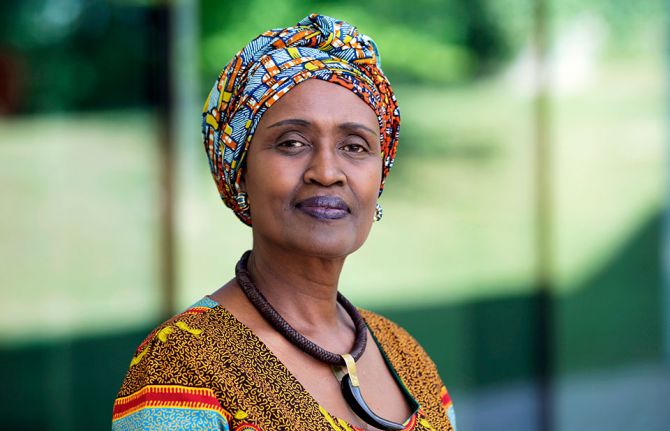
Press Statement
Statement by Winnie Byanyima, Executive Director of UNAIDS, on the occasion of World Health Day
07 April 2021 07 April 2021Winnie Byanyima, Executive Director of UNAIDS and Under-Secretary-General of the United Nations
7 April 2021
Tisha (not her real name), a young woman from the slums in east Africa, was three weeks past her due date when she was referred as an emergency case to the maternity facility in the main town.
With specialist medical attention, Tisha gave birth to a healthy baby boy, whom she named Okello. But instead of being a moment of joy for Tisha and her family, when she was unable to pay the US$ 30 delivery fee the hospital refused to discharge her.
Tisha was promptly moved to a special detention ward housing 42 other poor mothers and allocated a bed already shared by two women and their babies. Tisha and Okello would not be allowed to leave until she cleared her bill, which, the nurses told her, would rise daily. Tisha and her son were held captive until she could find the money to pay her bill.
This tragic story is all too common. Paying for health is the most regressive way of financing health care. Yet, according to the World Bank, two thirds of African countries are charging user fees at all levels of care.
Ten thousand people die every day because they cannot access health care and the cost of health services mean that every year 100 million people are pushed into extreme poverty paying for them. That equates to three people every second.
These huge inequalities in health care continue to widen as health systems around the world increasingly become profit-led. Many of the poorest countries in the world are trying to sell health through health insurance and user fees. But how can you sell health to somebody who does not have even the basics to survive, to someone who doesn’t have a job and is struggling to find the next meal.
Many governments claim that they cannot afford to pay for health, but the reality is that they can if they tax progressively so that everyone pays their fair share, stop companies from hiding their profits offshore and end tax exemptions. This would go a long way towards balancing the glaring inequalities in access to public services, including health care.
These profit-driven models have fragmented already weak health systems that exclude many people—poor people, lesbian, gay, bisexual, transgender and intersex people, prisoners, sex workers, people who inject drugs and numerous marginalized groups. The way health is financed is inequitable. In addition, the lack of human rights for marginalized groups denies them access to quality health care.
Inequalities in human rights result in inequalities in health. The right to health of ALL is part of the 1948 Universal Declaration of Human Rights. It states that, “Everyone has the right to a standard of living adequate for the health and well-being of himself and of his family, including food, clothing, housing and medical care and necessary social services, and the right to security in the event of unemployment, sickness, disability, widowhood, old age or other lack of livelihood in circumstances beyond his control.”
The biggest steps forward in health have often happened in response to a major crisis—think of the post-Second World War health systems across Europe and in Japan, or how AIDS led to universal health care in Thailand.
Now, in the midst of the COVID-19 crisis, leaders across the world have an opportunity to build the health systems that were always needed, and which cannot be delayed any longer. We cannot tinker around the edges—we need radical, transformative shifts. The COVID-19 response gives us an opportunity to change the rules and guarantee equality.
On World Health Day 2021, let us make that call to ensure that people’s lives come before profits. Let governments make the commitment that they will guarantee that everyone, without discrimination, has access to quality health care. The right to health is an inalienable human right.
This coronavirus crisis we find ourselves in today could, like other global crises before, create the global and national solutions in health care we so desperately need. Let’s seize the moment!
UNAIDS
The Joint United Nations Programme on HIV/AIDS (UNAIDS) leads and inspires the world to achieve its shared vision of zero new HIV infections, zero discrimination and zero AIDS-related deaths. UNAIDS unites the efforts of 11 UN organizations—UNHCR, UNICEF, WFP, UNDP, UNFPA, UNODC, UN Women, ILO, UNESCO, WHO and the World Bank—and works closely with global and national partners towards ending the AIDS epidemic by 2030 as part of the Sustainable Development Goals. Learn more at unaids.org and connect with us on Facebook, Twitter, Instagram and YouTube.

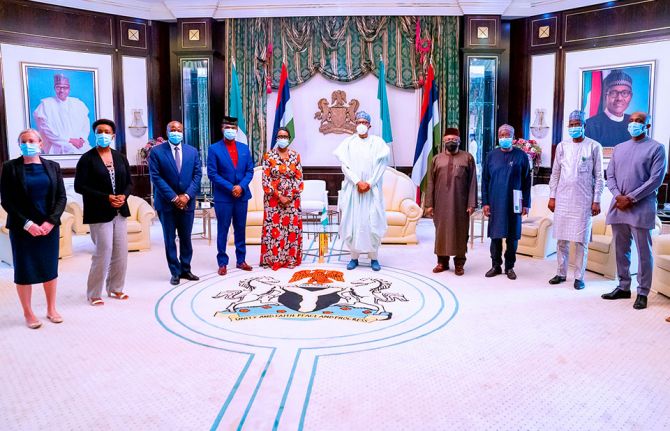
Press Release
UNAIDS Executive Director, Winnie Byanyima, meets with President of Nigeria, Muhammadu Buhari
10 March 2021 10 March 2021ABUJA/GENEVA, 10 March 2021—The UNAIDS Executive Director, Winnie Byanyima, has met the President of Nigeria, Muhammadu Buhari, to discuss the country’s response to the colliding pandemics of HIV and COVID-19. The meeting was part of Ms Byanyima’s three-day visit to the country, which also included visits to communities on the frontline of the response and events to mark International Women’s Day on 8 March.
During their meeting, Ms Byanyima thanked Mr Buhari for being an early champion of the People’s Vaccine campaign, which is calling for a fair and equitable distribution of vaccines against the coronavirus to ensure that poorer countries are not left behind in the response. Nigeria began to vaccinate frontline health workers last weekend after taking delivery of 4 million doses of vaccine, facilitated through COVAX, the international mechanism set up to bulk buy vaccines and distribute them equitably worldwide. Of 300 million vaccine doses administered worldwide so far, most have been administered in just 10 countries.
Ms Byanyima also applauded the country’s progress against the HIV pandemic and said UNAIDS stood ready to strengthen its partnership with Nigeria to further reduce the impact of the HIV pandemic and end AIDS as a public health threat as part of the 2030 Agenda for Sustainable Development.
“Nigeria has made good progress on expanding the delivery of HIV testing, treatment and care services over recent years, contributing to a steep decline in AIDS-related deaths,” said Ms Byanyima. “I look forward to reinforcing UNAIDS’ partnership with government, communities and all other stakeholders to drive new HIV infections down and kick-start a decade of action to end AIDS as a public health threat for everyone.”
There were 1.8 million people living with HIV in Nigeria in 2019 and 1.3 million people know their HIV status. Around 1.1 million people are now on HIV treatment to keep them alive and well. AIDS-related deaths have fallen by more than a third over the past decade, although HIV infections have declined at a more modest rate.
During her visit, Ms Byanyima also met community activists, who have been instrumental in minimizing the disruption to HIV testing, treatment and care services despite the challenges caused by the COVID-19 pandemic and the measures taken to contain it.
On Monday, Ms Byanyima took part in events to commemorate International Women’s Day hosted by the Federal Minister of Women’s Affairs, Pauline Tallen. Ms Byanyima stressed the importance of women’s leadership and participation at all levels of decision-making to ensure that issues of importance to women, such as ending gender-based violence and expanding access to essential services, including health and education, were addressed.
UNAIDS
The Joint United Nations Programme on HIV/AIDS (UNAIDS) leads and inspires the world to achieve its shared vision of zero new HIV infections, zero discrimination and zero AIDS-related deaths. UNAIDS unites the efforts of 11 UN organizations—UNHCR, UNICEF, WFP, UNDP, UNFPA, UNODC, UN Women, ILO, UNESCO, WHO and the World Bank—and works closely with global and national partners towards ending the AIDS epidemic by 2030 as part of the Sustainable Development Goals. Learn more at unaids.org and connect with us on Facebook, Twitter, Instagram and YouTube.
Contact
UNAIDS AbujaTemitope Fadiya
tel. +234 802 366 0244
temitopef@unaids.org
UNAIDS Geneva
Michael Hollingdale
tel. +41 79 500 2119
hollingdalem@unaids.org
Region/country

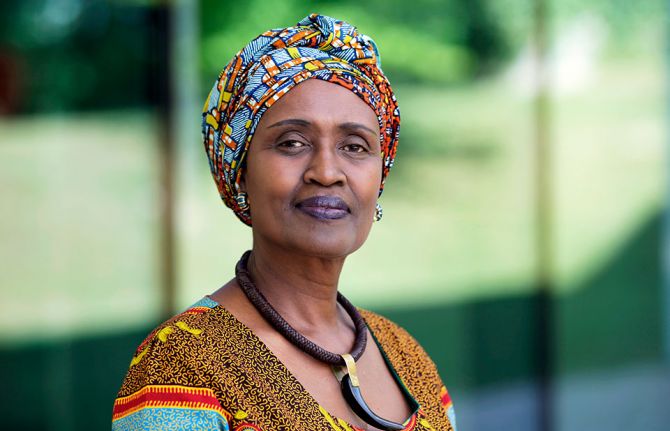
Press Statement
Message from the UNAIDS Executive Director on Zero Discrimination Day 2021
01 March 2021 01 March 2021This year’s Zero Discrimination Day is an especially poignant one.
It was said at first that viruses don’t discriminate. But as we’ve witnessed again, crises, and societies, do.
COVID-19 has magnified the fissures in society. It has seen marginalized communities, who were already on the edge, taking the hardest economic hit, getting stuck at the back of the line for vital services and getting scapegoated for the crisis.
Yet the crisis has also seen the most excluded communities being, once again, the first to step up to help—rooted in their expertise from experience, in their empathy and in their insistence that health for all and a recovery for all is possible.
UNAIDS joins with communities across the world in demanding equality. We say a resolute no to all inequalities—whether because of gender, income, race, disability, sexual orientation, ethnicity and religion. Such inequalities disfigure society and undermine justice and dignity.
We demand an end to discrimination, stigmatization and criminalization.
We challenge all institutions and all people of influence to not only be non-discriminatory, but to be anti-discrimination.
Discrimination kills. It exacerbates emergencies and it perpetuates pandemics.
The world is off track to end AIDS by 2030 not because of a lack of knowledge, capability or means but because of structural inequalities that stand in the way. For example, research shows that punitive laws regarding sexual orientation double the likelihood of acquiring HIV for gay men and other men who have sex with men. Repealing such laws is central to beating the HIV pandemic.
So too, discrimination against migrants and other excluded and stigmatized populations is obstructing their access to COVID-19 testing, treatment and support. This hurts everybody.
We are seeing the discrimination that scars our countries play out also at the international level. As new vaccines against COVID-19 have become available, there has been gross inequity. Just 10 countries have administered more than 75% of all COVID-19 vaccines, while more than 130 countries have not received a single dose. South Africa has called this vaccine apartheid. As the United Nations Secretary-General has said, “Vaccine equity is ultimately about human rights ... Vaccine nationalism denies it.” Around the world, and in every country, we must value every person as equally precious.
Ending inequalities will advance the human rights of all, make societies better prepared to beat COVID-19 and future pandemics and support economic recovery and stability.
We need to ensure everyone’s right to health through publicly provided and financed health care—and provide it respectfully to all, without reservation or judgement.
All of us need to call out discrimination wherever we see it, and to work to set an example.
A healthier, safer, more equal and prosperous world depends on it.
I am inspired by the leadership shown by communities facing discrimination. Their determination, courage and vision is our guiding light. The United Nations stands alongside, as a resolute ally for equality.
End inequalities. Demand zero discrimination.
Winnie Byanyima, Executive Director of UNAIDS
UNAIDS
The Joint United Nations Programme on HIV/AIDS (UNAIDS) leads and inspires the world to achieve its shared vision of zero new HIV infections, zero discrimination and zero AIDS-related deaths. UNAIDS unites the efforts of 11 UN organizations—UNHCR, UNICEF, WFP, UNDP, UNFPA, UNODC, UN Women, ILO, UNESCO, WHO and the World Bank—and works closely with global and national partners towards ending the AIDS epidemic by 2030 as part of the Sustainable Development Goals. Learn more at unaids.org and connect with us on Facebook, Twitter, Instagram and YouTube.
Press centre
Download the printable version (PDF)

